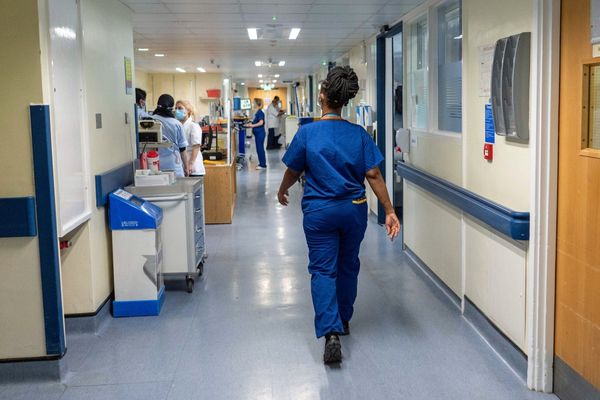Alex Fourie weighed 34 ½ pounds when he came to America at the age of 7.
“The only thing we really ate was soup,” said Fourie, “and it’s really hard to eat soup with a hole in your mouth.”
Fourie, 27, spent the first seven years of his life in Ukrainian orphanages and believes the cleft lip and cleft palate he suffered could’ve resulted from being born near Chernobyl, the world’s worst nuclear disaster. Fourie was also born with one arm.
Adopted by South African missionaries who were serving in Alabama, Fourie first picked up a golf club within days of moving to his new home. Now, the PGA teaching pro is using his golf connections to give back to the orphanage that kept him alive all those years ago.
“My friends keep sending me videos of my village and my town getting bombed,” said Fourie, who grew up in the city of Cherkasy.
There are 175 kids still living in Fourie’s former orphanage, and with the Russian military shelling hospitals, schools and children’s homes, he couldn’t simply sit and watch from the safety of his home in Tennessee.
“I was ready to go over there to be honest,” he said. “I was looking at flights.”
The new father instead decided to sell T-shirts through his charity, Single Hand Golf, with 100 percent of the proceeds going to Hope Now, the missionary organization that connected him with a family all those years ago.
It takes roughly $1,000 in fuel costs for the two- to three-day trip to move the orphans to safety on the Romania border. On Monday, Fourie cut a $3,000 check to Hope Now. After he appeared on “Fox & Friends” Saturday morning to share his story, servers for both the Hope Now and T-shirt websites crashed.

The founder of Hope Now, Vic Jackopson, first laid eyes on 2-year-old Fourie in a baby orphanage.
“His heart was broken for me,” Fourie said.
Jackopson came back to the orphanage five months later to adopt him only to find that the young boy had been moved to an orphanage with older children – only there was no paperwork trail, no name to connect them.
Because Fourie had been labeled as having mental disabilities, he wouldn’t be able to be adopted out of Ukraine past the age of 7.
In 1999, an orphanage director called Jackopson and told him about a young boy who needed to be adopted quickly. Jackopson happened to be visiting the church of a pastor friend in Birmingham, Alabama, that weekend. On Saturday, Elizabeth and Anton Fourie learned that yet another fertility treatment hadn’t worked. The next day, their friend Jackopson told them of a boy in Ukraine who needed a family.
“It was a church-wide, communal agreement that I would be their child,” said Alex. “They all said, ‘Go get your kid!’ ”
Fourie met his parents for the first time on Mother’s Day in 1999 and got adopted exactly one month before his seventh birthday. An Alabama senator helped to rush through the paperwork. He gets chills thinking about how close he came to having to stay in Ukraine – alone and without the needed medical treatment.
Passing the test
Last year Fourie became a PGA member after passing the Player Ability Test in Cleveland, Tennessee, with a couple of shots to spare. He did it in rain pants on a steamy summer day after the head pro bailed him out for wearing shorts.
Fourie worked as an assistant pro at a par-3 course in Knoxville, but now makes his living selling roofs for Litespeed Construction while giving lessons on the side.
“I get on roofs for a living,” he said, laughing. “People underestimate me.”
The roofing job gives him more flexibility to play in tournaments. His 0.6 handicap index makes Fourie already among the best disabled golfers in the country. He won the first tournament he signed up for in the North American One-Armed Golfer Association and is “super pumped” about the U.S. Golf Association’s new U.S. Adaptive Open this summer on Pinehurst No. 6. The field will include 96 players.
“I love watching people fall in love with the game of golf,” said Fourie of his passion for teaching.
Cyndee Knight, president of Hope Now, knows the statistics for children who aren’t adopted out of the orphanages of Ukraine. Thirty percent commit suicide and more than double that number will have a criminal record. Hope Now funds small group homes for teenagers after they leave orphanages as well as medical programs and basic needs.
In the midst of war, some male orphans now find themselves patrolling the cities at night as new members of the Ukrainian Army, scared and in search of food. Everywhere Knight turns, there’s a need.
She has five vans that are used to shuttle orphans and their state-appointed guardians to Romania. The cost of diesel is high and most of the old vans require regular repairs. It’s difficult to find safe, local drivers who will leave their families and responsibilities to help transport orphans across dangerous roads. So far, they’ve moved 150 people to safety, mostly women and children.
“They are projecting 100,000 new orphans after this war,” said Fourie.

It’s snowing now back home in Cherkasy, which means that with bottled water in short supply, Ukrainians are having to boil the snow. Fourie hasn’t been back to Ukraine since he left in 1999, but he’s already making plans in his mind to help rebuild.
Despite the trauma that took place there, Ukraine will always be home to Fourie. He’ll always hold a special place in his heart for her people – especially the most vulnerable.
“We’re all fighters to stay alive,” said Fourie. “Watching the spirit of the Ukrainian people fight for their land has given me great pride and joy knowing that I’ve got a little bit of that spirit in me as well.”







